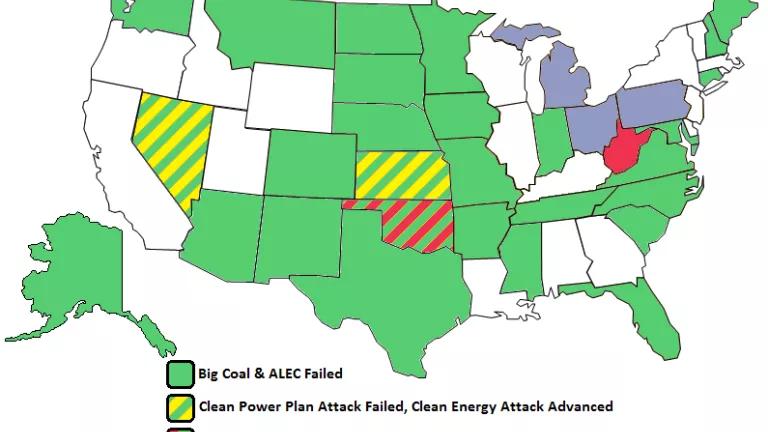ALEC's climate denial strategies flop in 2015 sessions; Major utility AEP drops membership

One of the country's largest utility companies, American Electric Power (AEP), made waves yesterday when it confirmed it has dropped membership from a prominent climate denial front group. The American Legislative Exchange Council (ALEC) has already lost a number of members including Google, Facebook and Yahoo due to its misguided climate positions. However, AEP's defection is surprising not only because it is a major coal-invested utility company, but also because it was the chair of ALEC's environmental task force - the committee that produces all of ALEC's anti-environmental model bills.
Why did AEP drop out of ALEC? Here's the statement from an AEP spokeswoman, reported by The Guardian yesterday:
"We let (Alec) know that we won't be renewing our membership in 2016. We are reallocating our resources as we focus on our work with the states around the Clean Power Plan. There are a variety of reasons for the decision. We have long been involved in the reduction of greenhouse gas emissions."
With many coal plants operating in several states, AEP is far from a clean energy company. It still holds memberships in other associations that maintain ties with ALEC, including the Edison Electric Institute and the American Coalition for Clean Coal Electricity. AEP is also part of the Utility Air Regulatory Group (UARG), which is party to a lawsuit challenging the Clean Power Plan, the new carbon pollution limits on power plants.
However, AEP's statement highlights how most utilities want to work constructively with governors to implement the carbon pollution limits. The Clean Power Plan is achievable and offers a great deal of flexibility, so most utilities aren't keen on ALEC's blunt strategies to obstruct it.
And ALEC has done a poor job of pushing forward these blunt strategies. The polluter front group has about half a dozen model bills opposing the Clean Power Plan. During the 2015 legislative sessions, state bills inspired by those ALEC models were stymied in 23 of 24 states. A few state legislatures are still in session until the end of December, but we expect that ALEC-inspired attacks won't move far. Take a look at the map below, created with the help of my colleague, Sean Alcorn:
Why is ALEC losing? A few months ago, I explained the failure of ALEC's CPP attacks that aimed to block governors from complying with the new pollution limits. States and utilities prefer to chart their own pollution reduction path rather than hand the keys over to EPA to issue a federal plan.
Looking ahead to 2016, I would expect ALEC will begin supporting litigation strategies against the CPP. ALEC began dabbling in this area last year when researchers uncovered documents showing ALEC encouraging attorneys general to participate in lawsuits against federal carbon pollution limits. It will also continue to obstruct and delay the Clean Power Plan through legislatures, as it just passed a new model bill in September that would hinder state compliance. Even though ALEC is losing major membership support over its climate denial, we haven't seen any signs that the front group is changing its tune.
Perhaps AEP's defection is a sign that climate denial is a losing strategy. It's becoming unacceptable to simply block climate solutions and buck the responsibility to act. Renewable energy is popular on both sides of the aisle in many states. Republicans and Democrats see that our future is in clean energy, not in the old, dirty technologies from the 19th century. Maybe AEP was struck by Arnold Schwarzenegger's Facebook post on Monday:
"I don't want to be like the last horse and buggy salesman who was holding out as cars took over the roads. I don't want to be the last investor in Blockbuster as Netflix emerged. That's exactly what is going to happen to fossil fuels."
